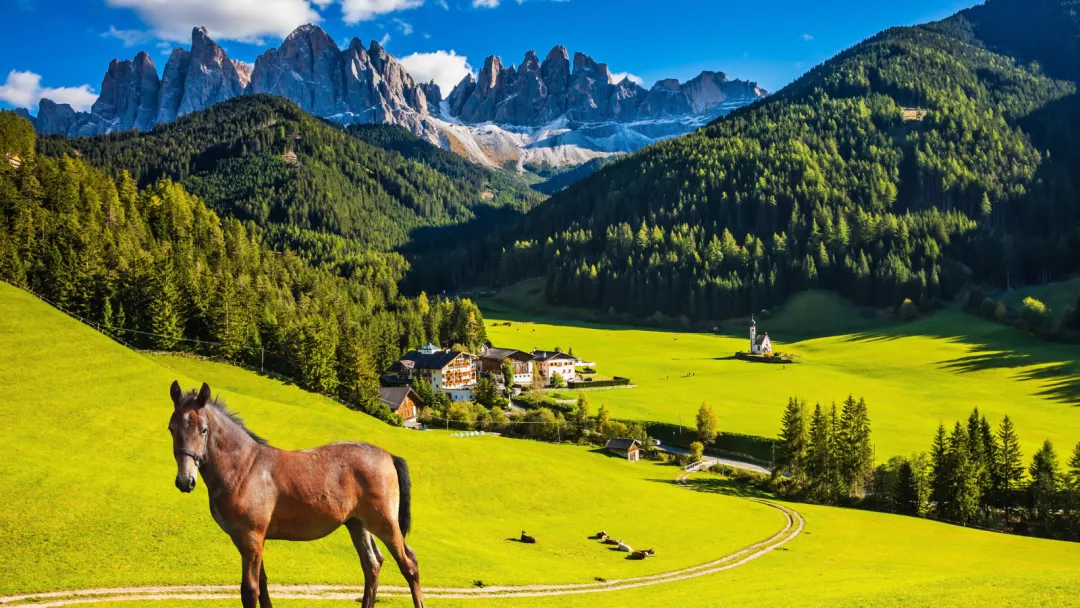This Good Practice Webinar, organised by the Rural Pact Support Office in partnership with the European Federation of Rural Tourism (RuralTour), showcased innovative approaches that link sustainable tourism, heritage conservation and entrepreneurship. It explored policy measures and incentives that support sustainable tourism, including investment opportunities, infrastructure improvements, and the promotion of entrepreneurship in rural areas.
Community group on rural tourism Community group on rural culture and creativity
Objectives
- Facilitate exchange of and learning from good practices and strategies that contribute to making tourism a driver of sustainable development;
- Build the capacity of rural communities, policymakers, and entrepreneurs to develop impactful and inclusive tourism initiatives that address rural needs;
- Engage and mobilise the Rural Pact Community and key stakeholders, including tourism professionals, policymakers, and community organisations, to foster collaborative approaches.
The webinar was targeted at public authorities, tourism and cultural heritage professionals, entrepreneurs, rural development practitioners, and community-based organisations, including potential local project holders, local/ regional and national private and public actors.
Videos
- Welcome and introduction to the day
- Setting the scene: EU initiatives to support sustainable rural tourism
- Challenges and opportunities for tourism as a driver for rural development
- Learning from inspirational projects and practices
- Framing the debate: tourism and rural development – a policy perspective
- Community participation, cultural heritage, and destination management
- Climate-friendly, resilient, and sustainable rural tourism
- Group discussion reporting, stakeholder panel, and closing remarks
Resources
Web platforms and tools
- EU Tourism Platform
- Rural Pact Community Group on culture and creativity in rural areas
- Self-assessment tool for local public authorities in tourism destinations in rural areas (STAR)(UN Tourism)
- CREATOUR Observatory
- Documentary on creative tourism in Portugal (subtitles in Portuguese, English, Italian and Greek) (CREATOUR)
Projects
Organisations
- RURALTOUR
- European Network of Cultural Centres (ENCC)
- Working Group on non-urban culture (ENCC)
- Network of European Regions for Sustainable and Competitive Tourism (NECSTouR)
- UN TOURISM
- CREATOUR
Competitions
- Best Tourism Villages (UN Tourism)
Publications
- EU strategy for sustainable tourism
- Guide on EU funding for tourism
- Heritage as a catalyst for societal transformation: towards viable local creative ecosystems in Poland and France (ENCC)
- Tourism and Rural Development: A Policy Perspective
- Toolkit of Indicators for Projects (TIPs): achieving the sustainable development goals through tourism (UN Tourism)
- Creative tourism: guide for practitioners (CREATOUR)
- Policy recommendations on creative tourism development in small cities and rural areas (CREATOUR)
- Creative Tourism, Regenerative Development, and Destination Resilience: Insights and Reflections (CREATOUR, 2024)
- Culture-tourism entanglements: Moving from grassroots practices to regenerative cultural policies in smaller communities (International Journal of Cultural Policy, 2025)
- Catalyzing creative tourism in small towns and rural areas (CREATOUR)
- Full book (in PT only)
- Creative Tourism Development Models towards Sustainable and Regenerative Tourism (CREATOUR article)
- Activating creative tourism in small cities and rural areas in Portugal: The CREATOUR research-and-application approach (CREATOUR, introductory chapter in EN)
Background
Tourism, when effectively integrated with cultural heritage, environmental conservation and community participation, is a key driver of sustainable development in rural areas across Europe. A study, co-authored by the European Committee of the Regions (CoR) and the UN’s World Tourism Organization (UN Tourism), highlights the sector’s potential to foster economic diversification, create jobs, and safeguard cultural heritage. Rural tourism serves as a bridge between tradition and modernity, enhancing community participation, sustaining local services, and preserving the unique identity of rural regions.
Despite its potential, rural tourism faces challenges such as inadequate access and infrastructure, limited financial resources, low skills levels and population decline. Yet, these issues can also be viewed as catalysts for innovation and investment. Addressing them requires a multidimensional approach, leveraging policy frameworks that support territorial development, digital transformation, environmental sustainability, and social inclusion.
The EU actively supports rural tourism by funding initiatives for sustainable rural development. The common agricultural policy (CAP) plays a key role in supporting food tourism, farm diversification, and nature-based tourism through funding for eco-tourism initiatives, cultural and culinary experiences, and ecosystem services that enhance rural attractiveness.
Programmes and initiatives such as the Erasmus+, Cohesion Policy funds (including the European Regional Development Fund and its Interreg strand) , Horizon Europe, and New European Bauhaus (NEB), play a role in strengthening local economies, protecting and valorising cultural assets, and fostering sustainable tourism across member states. The Sustainable Tourism Partnership under the Urban Agenda for the EU recognises the importance of urban-rural cooperation to develop more sustainable and resilient tourism models, including in efforts to diversify the tourism offer.
Useful links
- Long-term vision for rural areas
- Join the online Rural Pact Community Groups on sustainable rural tourism and culture and creativity in rural areas
Programme
Agenda
(PDF – 211.14 KB)

